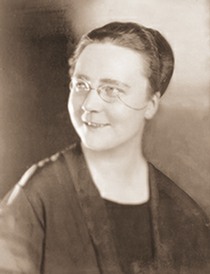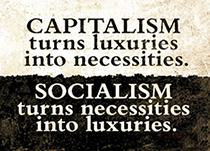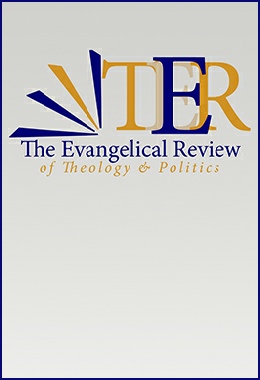THE EVANGELICAL REVIEW OF THEOLOGY & POLITICS
VOL. 5, 2017
ESSAY SERIES
‘Purge the Old Leaven:
Aspects of Church Discipline in
the Bible, Theology, and Culture’
A series of essays
Full contents/details of the essay series
REVIEW ARTICLES
Review Article
Race and the Political in 21st Century Evangelical America: A Review Essay
Christopher M. Driscoll, White Lies: Race and Uncertainty in the Twilight of American Religion
Andrew T. Draper, A Theology of Race and Place: Liberation and Reconciliation in the Works of Jennings and Carter
Brian Bantum, The Death of Race: Building a New Christianity in a Racial World
Josef Sorett, Spirit in the Dark: A Religious History of Racial Aesthetics
Ashon T. Crawley, Blackpentecostal Breath: The Aesthetics of Possibility
KEY WORDS
|| Whiteness || Aesthetics || Hybridity || Afropentecostalism ||
|| Ethnicity || African American Evangelicalism ||
Reviewed by Amos Yong
Uploaded/Published : May 17, 2017 | ERTP Vol 5, 2017, pages, RA1-12.
ARTICLES
Article
P.H. Brazier, ‘Fyodor Mikhailovich Dostoevsky: Bible, Pneumatology and the Supernatural, Spiritism and Epilepsy – Evil and the Body Politic’
KEY WORDS
|| Angels and Demons || Christlikeness || Epilepsy || Good and Evil ||
|| Politics || The Holy Spirit || Sin and Possession || Supernatural ||
ABSTRACT
 To what extent is the Russian writer Dostoevsky’s beliefs and faith conditioned, formed, by his youthful involvement in Spiritism and revolutionary politics, also by his epilepsy. How does this influence his triune understanding, specifically the pneumatological action of God in relation to sin and evil? Is evil for Dostoevsky primarily a case of bad politics, corrupted self-serving actions conflated into the public arena, through government and legislation? As theologian, prophet, and novelist, we can understand this development of Dostoevsky’s beliefs from the impetuous naive socialism of his misspent youth through to his deep mature faith, grounded in the Bible: for example, the profound impact the mock execution had leading to Dostoevsky’s imprisonment/exile for revolutionary sedition in a forced labour camp in Siberia, which triggered his return to faith through his discovery of the Russian New Testament, which he studied on a daily basis for the remainder of his life (is his mature faith more biblical than Russian Orthodoxy?). In conclusion we may ask, rhetorically, was Dostoevsky fearful of the Holy Spirit and the supernatural because of this youthful involvement in revolutionary politics (nineteenth century Russian anarchistic socialism and proto-Marxism) and his socialite flirtation with demonically driven Spiritism: both of which he repented of in his mature years and works.
To what extent is the Russian writer Dostoevsky’s beliefs and faith conditioned, formed, by his youthful involvement in Spiritism and revolutionary politics, also by his epilepsy. How does this influence his triune understanding, specifically the pneumatological action of God in relation to sin and evil? Is evil for Dostoevsky primarily a case of bad politics, corrupted self-serving actions conflated into the public arena, through government and legislation? As theologian, prophet, and novelist, we can understand this development of Dostoevsky’s beliefs from the impetuous naive socialism of his misspent youth through to his deep mature faith, grounded in the Bible: for example, the profound impact the mock execution had leading to Dostoevsky’s imprisonment/exile for revolutionary sedition in a forced labour camp in Siberia, which triggered his return to faith through his discovery of the Russian New Testament, which he studied on a daily basis for the remainder of his life (is his mature faith more biblical than Russian Orthodoxy?). In conclusion we may ask, rhetorically, was Dostoevsky fearful of the Holy Spirit and the supernatural because of this youthful involvement in revolutionary politics (nineteenth century Russian anarchistic socialism and proto-Marxism) and his socialite flirtation with demonically driven Spiritism: both of which he repented of in his mature years and works.
Uploaded//Published : August 1, 2017 | ERTP Vol 5, 2017, pages, A1-24.
Article
Andrew J. Spencer, ‘Dorothy L. Sayers as a Cautious Transformationalist’
KEY WORDS
|| Dorothy L. Sayers || Political Theology || Christ and Culture ||
|| H. Richard Niebuhr || Vocation || Transformationalist ||
ABSTRACT
 Dorothy L. Sayers is most famous for her detective fiction, particularly the mystery novels involving Lord Peter Wimsey. Her greatest gift to history, however, is the application of a faithful concept of vocation to her art. Based on a speech delivered to the Archbishop of York’s conference in Malvern, 1941, it appears Sayers had something like a transformationalist view according to Niebuhr’s model. She saw withdrawing from the culture and becoming one with the culture as a pair of matched dangers. The first effectively privatizes Christianity and the second denatures it. Accordingly, Sayers’ believed the Church must do the impossible: without becoming identified with cultural institutions, it must redeem those institutions. The church must influence morality, but not get tied to the moralistic aspects of cultural institutions. This essay presents the case that Sayers was a cautious transformationalist. She believed that Christianity could permeate and redeem every form of art and every institution to improve it and make it more consistent with God’s creational design. In a period of growing cultural marginalization, Sayers’ example presents a way for Christians to point people toward a robust understanding of human flourishing.
Dorothy L. Sayers is most famous for her detective fiction, particularly the mystery novels involving Lord Peter Wimsey. Her greatest gift to history, however, is the application of a faithful concept of vocation to her art. Based on a speech delivered to the Archbishop of York’s conference in Malvern, 1941, it appears Sayers had something like a transformationalist view according to Niebuhr’s model. She saw withdrawing from the culture and becoming one with the culture as a pair of matched dangers. The first effectively privatizes Christianity and the second denatures it. Accordingly, Sayers’ believed the Church must do the impossible: without becoming identified with cultural institutions, it must redeem those institutions. The church must influence morality, but not get tied to the moralistic aspects of cultural institutions. This essay presents the case that Sayers was a cautious transformationalist. She believed that Christianity could permeate and redeem every form of art and every institution to improve it and make it more consistent with God’s creational design. In a period of growing cultural marginalization, Sayers’ example presents a way for Christians to point people toward a robust understanding of human flourishing.
Uploaded//Published : August 11, 2017 | ERTP Vol 5, 2017, pages, A25-40.
Article
Clive Beed and Cara Beed, ‘Conceptions of Capitalism in Biblical Theology’
KEY WORDS
|| Capitalism || Socialism || Private || Ownership || Compatibility || Markets ||
ABSTRACT
 Both capitalism and socialism are incompatible with biblical theology, according to theologian, Craig Blomberg. He believes that a biblical theology of economics favours neither system. Making a judgment on these matters depends on what is meant by capitalism and socialism, and what is compared with biblical understanding. Definitions of these systems are reviewed, and reasons evaluated for reaching a nihilistic conclusion concerning the admissibility of capitalism and socialism. The conclusion is that biblical theology is compatible with a reformed Christian-based capitalism, in which Christians would practice their biblical guides more stringently than at present..
Both capitalism and socialism are incompatible with biblical theology, according to theologian, Craig Blomberg. He believes that a biblical theology of economics favours neither system. Making a judgment on these matters depends on what is meant by capitalism and socialism, and what is compared with biblical understanding. Definitions of these systems are reviewed, and reasons evaluated for reaching a nihilistic conclusion concerning the admissibility of capitalism and socialism. The conclusion is that biblical theology is compatible with a reformed Christian-based capitalism, in which Christians would practice their biblical guides more stringently than at present..
Uploaded//Published : September 11, 2017 | ERTP Vol 5, 2017, pages, A41-56.
BOOK REVIEWS
Review
Nick Spencer, The Mighty and the Almighty: How Political Leaders Do God,
London: Biteback Publishing, 2017.
Reviewed by Anthony A.J. Williams.
Uploaded/Published : May 29, 2017 | ERTP Vol 5, 2017, pages, BR1-4.
Review
John Corvino, Ryan T. Anderson, and Sherif Girgis, Debating Religious Liberty
and Discrimination, New York: Oxford University Press, 2017.
Reviewed by Daniel Brockway.
Uploaded/Published : June 26, 2017 | ERTP Vol 5, 2017, pages, BR5-6.
Review
Lisa E. Dahill and James B. Martin-Schramm, eds.,
Eco-Reformation: Grace and Hope for a Planet in Peril,
Eugene, OR: Cascade Books, 2016.
Reviewed by Joshua Beckett.
Uploaded/Published : July 16, 2017 | ERTP Vol 5, 2017, pages, BR7-8.
Review
Elicka Peterson Sparks,
The Devil You Know: The Surprising Link between
Conservative Christianity and Crime,
Amherst, NY: Prometheus Books, 2016.
Reviewed by Stephen M. Vantassel.
Uploaded/Published : July 22, 2017 | ERTP Vol 5, 2017, pages, BR9-12.
Review
Justo L. González,
A Brief History of Sunday: From the New Testament to the New Creation,
Grand Rapids, MI: Wm. B. Eerdmans Press, 2017.
Reviewed by Jennifer L. Ackerman.
Uploaded/Published : July 23, 2017 | ERTP Vol 5, 2017, pages, BR13-14.
Review
Mark R. Amstutz,
Just Immigration: American Policy in Christian Perspective,
Grand Rapids, MI: Eerdmans, 2017.
Reviewed by Esteban G. Miranda.
Uploaded/Published : August 21, 2017 | ERTP Vol 5, 2017, pages, BR15-16.
Review
Stephanie N. Arel, and Shelly Rambo, eds,
Post-Traumatic Public Theology,
London, UK: Palgrave Macmillan, 2016.
Reviewed by Matthew F. Jones.
Uploaded/Published : September 8, 2017 | ERTP Vol 5, 2017, pages, BR17-18.
Review
Olli-Pekka Vainio,
Disagreeing Virtuously: Religious Conflict in Interdisciplinary Perspective,
Grand Rapids, MI, William B. Eerdmans Publishing Company, 2017.
Reviewed by Judith C.P. Lin.
Uploaded/Published : September 10, 2017 | ERTP Vol 5, 2017, pages, BR19-20.
Review
Matthew J. Tuininga,
Calvin's Political Theology and the Public Engagement of the Church: Christ’s Two Kingdoms, (Cambridge Studies in Law and Christianity)
Cambridge: Cambridge University Press, 2017.
Reviewed by Timothy R. Scheuers.
Uploaded/Published : October 2, 2017 | ERTP Vol 5, 2017, pages, BR21-24.
Review
Donald Wallenfang,
Human and Divine Being: A Study on the Theological Anthropology of Edith Stein
Eugene, Oregon: Cascade Books, 2017.
Reviewed by David Muthukumar S.
Uploaded/Published : October 20, 2017 | ERTP Vol 5, 2017, pages, BR25-28.
Review
Matthew Levering,
Engaging the Doctrine of Creation:
Cosmos, Creatures, and the Wise and Good Creator
Grand Rapids, MI: Baker Academic, 2017.
Reviewed by Stephen M. Vantassel.
Uploaded/Published : October 26, 2017 | ERTP Vol 5, 2017, pages, BR29-30.
Review
William S. Morrow,
An Introduction to Biblical Law
Grand Rapids, MI: Eerdmans, 2017.
Reviewed by Jason A. Riley.
Uploaded/Published : October 26, 2017 | ERTP Vol 5, 2017, pages, BR31-32.
Review
Robert P. Menzies,
Speaking in Tongues: Jesus and the Apostolic Church
as Models for the Church Today
Cleveland, TN: CPT Press, 2017.
Reviewed by Mark Anderson.
Uploaded/Published : November 17, 2017 | ERTP Vol 5, 2017, pages, BR33-36.










 To what extent is the Russian writer Dostoevsky’s beliefs and faith conditioned, formed, by his youthful involvement in Spiritism and revolutionary politics, also by his epilepsy. How does this influence his triune understanding, specifically the pneumatological action of God in relation to sin and evil? Is evil for Dostoevsky primarily a case of bad politics, corrupted self-serving actions conflated into the public arena, through government and legislation? As theologian, prophet, and novelist, we can understand this development of Dostoevsky’s beliefs from the impetuous naive socialism of his misspent youth through to his deep mature faith, grounded in the Bible: for example, the profound impact the mock execution had leading to Dostoevsky’s imprisonment/exile for revolutionary sedition in a forced labour camp in Siberia, which triggered his return to faith through his discovery of the Russian New Testament, which he studied on a daily basis for the remainder of his life (is his mature faith more biblical than Russian Orthodoxy?). In conclusion we may ask, rhetorically, was Dostoevsky fearful of the Holy Spirit and the supernatural because of this youthful involvement in revolutionary politics (nineteenth century Russian anarchistic socialism and proto-Marxism) and his socialite flirtation with demonically driven Spiritism: both of which he repented of in his mature years and works.
To what extent is the Russian writer Dostoevsky’s beliefs and faith conditioned, formed, by his youthful involvement in Spiritism and revolutionary politics, also by his epilepsy. How does this influence his triune understanding, specifically the pneumatological action of God in relation to sin and evil? Is evil for Dostoevsky primarily a case of bad politics, corrupted self-serving actions conflated into the public arena, through government and legislation? As theologian, prophet, and novelist, we can understand this development of Dostoevsky’s beliefs from the impetuous naive socialism of his misspent youth through to his deep mature faith, grounded in the Bible: for example, the profound impact the mock execution had leading to Dostoevsky’s imprisonment/exile for revolutionary sedition in a forced labour camp in Siberia, which triggered his return to faith through his discovery of the Russian New Testament, which he studied on a daily basis for the remainder of his life (is his mature faith more biblical than Russian Orthodoxy?). In conclusion we may ask, rhetorically, was Dostoevsky fearful of the Holy Spirit and the supernatural because of this youthful involvement in revolutionary politics (nineteenth century Russian anarchistic socialism and proto-Marxism) and his socialite flirtation with demonically driven Spiritism: both of which he repented of in his mature years and works. Dorothy L. Sayers is most famous for her detective fiction, particularly the mystery novels involving Lord Peter Wimsey. Her greatest gift to history, however, is the application of a faithful concept of vocation to her art. Based on a speech delivered to the Archbishop of York’s conference in Malvern, 1941, it appears Sayers had something like a transformationalist view according to Niebuhr’s model. She saw withdrawing from the culture and becoming one with the culture as a pair of matched dangers. The first effectively privatizes Christianity and the second denatures it. Accordingly, Sayers’ believed the Church must do the impossible: without becoming identified with cultural institutions, it must redeem those institutions. The church must influence morality, but not get tied to the moralistic aspects of cultural institutions. This essay presents the case that Sayers was a cautious transformationalist. She believed that Christianity could permeate and redeem every form of art and every institution to improve it and make it more consistent with God’s creational design. In a period of growing cultural marginalization, Sayers’ example presents a way for Christians to point people toward a robust understanding of human flourishing.
Dorothy L. Sayers is most famous for her detective fiction, particularly the mystery novels involving Lord Peter Wimsey. Her greatest gift to history, however, is the application of a faithful concept of vocation to her art. Based on a speech delivered to the Archbishop of York’s conference in Malvern, 1941, it appears Sayers had something like a transformationalist view according to Niebuhr’s model. She saw withdrawing from the culture and becoming one with the culture as a pair of matched dangers. The first effectively privatizes Christianity and the second denatures it. Accordingly, Sayers’ believed the Church must do the impossible: without becoming identified with cultural institutions, it must redeem those institutions. The church must influence morality, but not get tied to the moralistic aspects of cultural institutions. This essay presents the case that Sayers was a cautious transformationalist. She believed that Christianity could permeate and redeem every form of art and every institution to improve it and make it more consistent with God’s creational design. In a period of growing cultural marginalization, Sayers’ example presents a way for Christians to point people toward a robust understanding of human flourishing. Both capitalism and socialism are incompatible with biblical theology, according to theologian, Craig Blomberg. He believes that a biblical theology of economics favours neither system. Making a judgment on these matters depends on what is meant by capitalism and socialism, and what is compared with biblical understanding. Definitions of these systems are reviewed, and reasons evaluated for reaching a nihilistic conclusion concerning the admissibility of capitalism and socialism. The conclusion is that biblical theology is compatible with a reformed Christian-based capitalism, in which Christians would practice their biblical guides more stringently than at present..
Both capitalism and socialism are incompatible with biblical theology, according to theologian, Craig Blomberg. He believes that a biblical theology of economics favours neither system. Making a judgment on these matters depends on what is meant by capitalism and socialism, and what is compared with biblical understanding. Definitions of these systems are reviewed, and reasons evaluated for reaching a nihilistic conclusion concerning the admissibility of capitalism and socialism. The conclusion is that biblical theology is compatible with a reformed Christian-based capitalism, in which Christians would practice their biblical guides more stringently than at present..